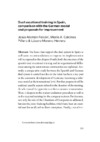Identificador persistente para citar o vincular este elemento:
https://accedacris.ulpgc.es/jspui/handle/10553/106675
| Título: | Dual vocational training in Spain, comparison with the German model and proposals for improvement | Autores/as: | Alemán Falcón, Jesús Calcines Piñero, María Ascensión Moreno Herrera, Lázaro |
Clasificación UNESCO: | 58 Pedagogía | Palabras clave: | Dual system Apprenticeship Comparative studies in VET |
Fecha de publicación: | 2019 | Editor/a: | Premiss förlag | Resumen: | Te bases that support the dual system in Spain as well some recommendations to improve its implementation will be exposed in this chapter. Firstly, both the structure of the spanish dual vocational training and its organizational diferences among the autonomous communities are explained. Secondly a comparative study between the Spanish and German dual system is carried out due to the latter has been a key part in the economic development of Germany, becoming a reference model at the international level. For that purpose it will be analyzed specifc aspects related to the duration of the training, the selection of the apprentices or their economic remuneration. Ten, it deepens in the student evaluation procedure as well as in the required training for the company trainers. Furthemore, not only the role of the Chambers of Companies is addressed, but also the Joint Training Facilities, which have been an essential tool for small and medium enterprises. Finally, a set of recommendations for the improvement of the Spanish dual system are presented | URI: | https://accedacris.ulpgc.es/handle/10553/106675 | ISBN: | 978-91-89077-01-0 | Fuente: | Facets and Aspects of Research on Vocational Education and Training at Stockholm University / Lázaro Moreno Herrera, Marianne Teräs & Petros Gougoulakis (eds.), p. 333-361 |
| Colección: | Capítulo de libro |
Visitas 5
421
actualizado el 15-ene-2026
Descargas
343
actualizado el 15-ene-2026
Google ScholarTM
Verifica
Altmetric
Comparte
Exporta metadatos
Los elementos en ULPGC accedaCRIS están protegidos por derechos de autor con todos los derechos reservados, a menos que se indique lo contrario.
